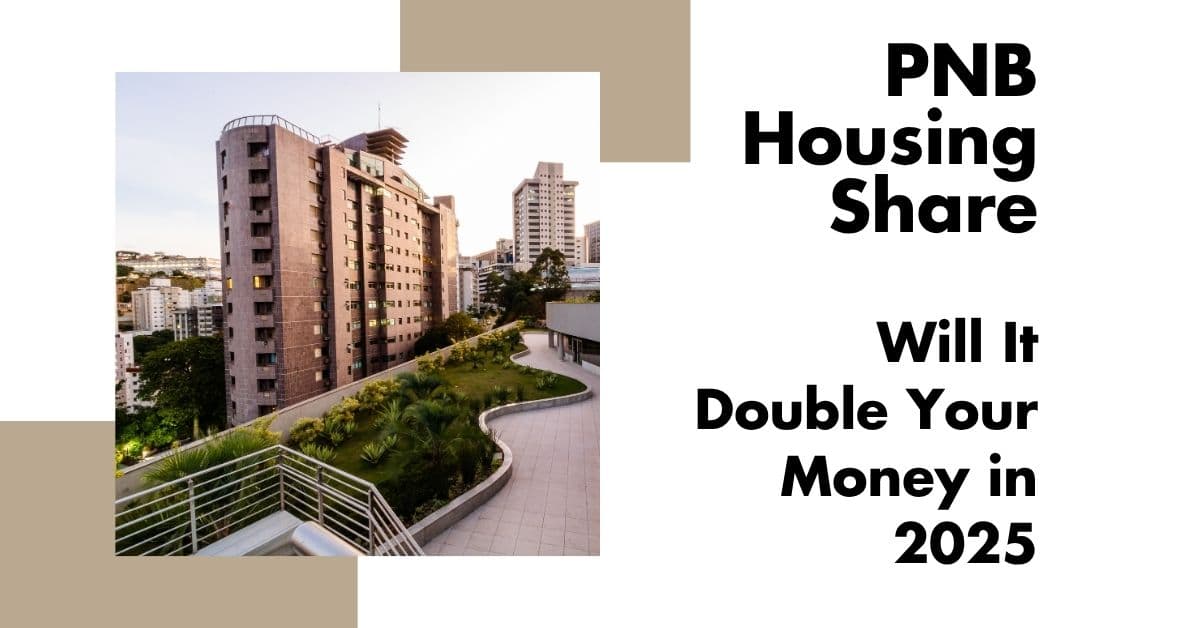PNB Housing Share – One of India’s top housing finance companies, PNB Housing Finance Limited, is a major provider of loans for real estate ventures, building projects, and home purchases. As of August 2, 2025, its market capitalisation is ₹21,289 crore (Screener), and its share price is around ₹809.55 on the NSE (ticker: PNBHOUSING). Investors are curious as to whether PNB Housing shares could double by the end of 2025, given that the housing financing market in India is expected to expand at a 15–16% CAGR through 2029–2030 (IBEF). To assist new investors in making smart choices and controlling risks in 2025, this article examines PNB Housing’s financial performance, share price outlook, industry trends, and a strong savings plan.
PNB Housing Finance: Overview of the Company
PNB Housing Finance Limited was established in 1988 and has its headquarters in Gurugram. It is a registered housing finance company with the National Housing Bank (NHB), and it is supported by Punjab National Bank (PNB), which owns 32.57% of the firm (ICICI Direct). The business provides a wide range of products, such as:
- Housing Loans: Pradhan Mantri Awas Yojana (PMAY) offers as well as home loans, land loans, and loans for home rehabilitation and building.
- Non-home loans: Include those secured by real estate, loans for business purposes, lease rental discounting, and loans for real estate developers.
- Fixed Deposits: NRI, joint, cumulative, and non-cumulative (Groww) fixed deposits.
PNB Housing is a leader in the housing finance industry, with a loan book of ₹80,000 crore as of FY25 and a network of 300 branches in more than 150 cities. It focusses on retail loans (73% prime loans) and affordable housing through its “Roshni” segment, which achieved a ₹1,000 crore loan book in less than a year (PNB Housing).
Market Performance and the Current Share Price
Due to recent volatility, PNB Housing’s share price is currently trading at about ₹809.55, down 17.84% from its previous closing of ₹986.20 as of August 2, 2025 (LiveMint). With a market valuation of ₹21,289 crore and a 52-week range of ₹746.10 to ₹1,201.45, the company has increased 21.8% in the last year (Screener). Important metrics for valuation include:

- P/E Ratio: Fair pricing is indicated by the P/E ratio of 14.15, which is marginally higher than the sector average of 12.08 (LiveMint).
- P/B Ratio: 1.67, which indicates market confidence and is higher than historical values (LiveMint).
- Dividend yield: With a dividend of ₹5 per share paid on August 1, 2025, the dividend yield was 0.85% (Trendlyne).
Due to increased investor interest, recent trading volumes jumped to 196.58 lakh shares on August 1, 2025, an 82.5-fold increase above the two-week average (Tickertape).
| Metric | Value |
| Share Price (Aug 2,2025) | ₹809.55 |
| 52-Week Range | ₹746.10-₹1,201.45 |
| Market Cap | ₹21,289 crore |
| TTM P/E Ratio | 14.15 (Sector: 12.08) |
| P/B Ratio | 1.67 |
| Dividend Yield | 0.85% |
Financial Performance
In recent times, PNB Housing Finance has seen strong financial growth:
April 2024–March 2025, or FY25:
- Revenue: Which shows consistent increase, is ₹7,884 crore.
- Net Profit: Compared to prior years, the net profit increased to ₹2,042 crore (Screener).
- Loan Book: 73% of the 80,000 crore loan book is made up of prime loans (Moneycontrol).
April–June 2025, Q1 FY26:
- Net profit: Increased by 23% year over year (YoY) to ₹534 crore.
- Net Interest Income (NII): Increased 17% year over year to ₹760 crore.
- Asset Quality: Retail disbursements in affordable and emerging segments accounted for 50% of total disbursements, while gross non-performing assets (NPAs) improved to 1.06% (Economic Times).
With Q4 FY25 net profit at ₹550.38 crore (increased 25.3% YoY) and Q1 FY26 sales at ₹2,081.87 crore (up 13.63% YoY), recent quarters demonstrate a comeback despite a historical sales growth of -2.03% over five years (INDmoney).
Analyst Forecasts and Stock Price Outlook
Although they are wary about short-term volatility, analysts are hopeful about PNB Housing’s long-term prospects:

- Median target: By mid-2026, the median target is ₹1,218.83, which represents a 50.5% increase from ₹809.55 (Economic Times).
- High Estimate: ₹1,386 (Economic Times), a 71% increase.
- Low Estimate: ₹1,020, a 26% upside.(Economic Times)
- Broker Recommendations: Citing strong loan growth and enhanced asset quality, Motilal Oswal suggests a “Buy” with a target of ₹1,230. However, because of recent volatility and changes in leadership, some analysts have downgraded to “Hold” (Trendlyne).
The stock would need to rise 100% in order to double an investment from ₹809.55 to ₹1,619.10 by December 2025 (five months), which is significantly higher than the maximum analyst forecast of ₹1,386. Such growth would necessitate extraordinary triggers, none of which are currently suggested, such as a large corporate event like a merger, a sector-wide re-rating, or a significant earnings surprise.
| Analyst | Target Price(₹) | Upside(%) | Recommendation |
| Motilal Oswal | 1,230 | 51.9 | Buy |
| Median (12 analysts) | 1,218.83 | 50.5 | – |
| High Estimate | 1,386 | 71.2 | – |
| Low Estimate | 1,020 | 26.0 | – |
Housing Finance Sector Outlook
The home finance sector in India is expected to grow rapidly, which will benefit PNB home.
- Market Size: Estimated at ₹33 lakh crore (US$379.7 billion) in 2025, the market is expected to grow at a 15–16% CAGR to reach US$886.1–932.3 billion by 2029–2030 (IBEF).
- Growth Drivers: Urbanisation, growing disposable incomes, and government programs like PMAY, which intends to build 2 crore homes, are the main drivers of growth (Basic Home Loan).
- Trends: Green funding (₹5,000 crore allotted in 2025) and PropTech adoption (estimated to reach $25 billion by 2025) improve sustainability and efficiency (Financial Express).
- Industry Share: HFCs like PNB home continue to hold a 19% share in the home loan industry, which is expanding at a 12% CAGR, while banks control 74.5% of the market (IBEF).
Although competition from banks and other HFCs is still a problem, this increase supports PNB Housing’s expansion aspirations, especially in the affordable housing sector.
The Growth Drivers for PNB Housing Share
PNB Housing is adopting a number of strategies to drive expansion:
- Network Expansion: Increased client reach by opening 300 branches in more than 150 cities (PNB Housing).
- Focus on Affordable Housing: In less than a year, the company’s “Roshni” sector achieved a loan book of ₹1,000 crore, with a goal of ₹1 trillion in retail loans by FY27 (INDmoney).
- Better Asset Quality: In Q1 FY26, gross non-performing assets (NPAs) decreased to 1.06%, indicating improved risk management (Economic Times).
- Digitalisation: According to Financial Express, investments in PropTech and AI-driven platforms improve client satisfaction and operational effectiveness.
- Stakeholder Confidence: By June 2025, mutual fund holdings had grown to 26.76%, indicating institutional backing, despite Carlyle Group selling off a 10.44% interest at ₹960 per share (LiveMint).
Risks and Challenges
Investing in PNB Housing involves a number of risks:
- Leadership Transition: Although the corporation stresses continuity in strategic aims, there may be some uncertainty with the resignation of MD & CEO Girish Kousgi, which takes effect on October 28, 2025 (Trendlyne).
- Market Volatility: The volatility of the market Price fluctuations are highlighted by a 21.33% drop during five trading sessions and a 42.5% annual decline (CNBC TV18).
- Competition: Market share is contested by banks and HFCs such as LIC Housing Finance and HDFC Housing Finance (Mordor Intelligence).
- Interest Rate Sensitivity: According to the Economic Times, rising interest rates may result in lower demand for loans and higher borrowing costs.
- Economic Risks: A slowdown may have an effect on asset quality and home demand.
Can PNB Housing Double Your Money By 2025?
A 100% growth in five months is necessary to double an investment from ₹809.55 to ₹1,619.10 by December 2025, which is a difficult goal considering current analyst projections. Even a re-rating to a P/E of 20 with annualised Q1 FY26 earnings (EPS ~₹82.08) produces a price of ~₹1,641.60, necessitating exceptional growth or market optimism. The highest objective of ₹1,386 (71% upside) is not met. Important elements that could result in notable gains are as follows:
- Sector Tailwinds: Growth is supported by a 15–16% CAGR in home finance (IBEF).
- Earnings Growth: Strong fundamentals are indicated by Q1 FY26’s 23% profit growth and a goal loan book of ₹1 trillion by FY27 (INDmoney).
- Market Re-rating: Valuations may rise in response to a sector-wide P/E expansion or better investor confidence.
- Catalysts: Possible mergers, acquisitions, or the introduction of new products—none of which have been reported yet—are catalysts.
However, expectations are tempered by risks such as competition, recent volatility, and the CEO’s exit. Without a significant catalyst, it is doubtful that PNB Housing will double by year’s end; but, significant gains (26–71%) are possible, making it an attractive long-term investment.
Building a Savings Plan for Investing
Use these five simple, beginner-friendly techniques to invest in PNB Housing without breaking the bank:

- Track Expenses: By reducing non-essentials like eating out or subscriptions, you can save ₹1,000 to ₹2,000 per month by using apps like Money View or Walnut to keep an eye on your spending (NerdWallet).
- Clear High-Interest Debt: Since credit card expenses are higher than PNB Housing’s possible profits (~10–15%), pay off credit cards (20–40%) or personal loans (10–20%) first. Using a ₹50,000 credit card at 36% and paying ₹5,000 a month saves ₹18,000 a year (Financial Express).
- Create an Emergency Fund: To prevent selling shares during downturns, put three to six months’ worth of expenses (₹1.5 to ₹3 lakh for ₹50,000 monthly income) into a high-yield savings account with HDFC Bank or SBI (Policybazaar).
- Start Small with Dollar-Cost Averaging: To lower volatility risk, spread purchases monthly and use dollar-cost averaging to invest ₹5,000 to ₹10,000 (6–12 shares at ₹809.55) (Zerodha).
- Diversify Your Portfolio: To reduce sector risks, keep PNB Housing to 5–10% of your portfolio and balance it with term deposits or Nifty 50 index funds (Groww).
It is essential to establish a solid savings base prior to investing in stocks like PNB Housing. The following five effective savings techniques can improve your financial situation and guide your smart investment decisions:
- Track Your Expenses: You can find wasteful spending by using budgeting tools like Money View. You can easily free up ₹1,000 or more per month by keeping track of your costs. This money can then be used for investing.
- Clear High-Interest Debt: Compared to most stock investments, paying off debts such as credit card amounts yields larger returns. For instance, paying off a ₹50,000 credit card debt might result in annual savings of ₹18,000, which is far greater than the typical profits from the stock market.
- Create an Emergency Fund: By putting aside ₹1.5 lakh in an emergency fund, you can guard against unforeseen expenses and avoid having to liquidate your investments when circumstances go rough. This preserves and expands your portfolio.
- Start Small with Stocks: To lower risk, start investing with small, controllable sums. For example, purchasing six PNB Housing shares at ₹830 a share would cost about ₹5,000, making it a smart and safe place to start.
- Invest Diversely: Avoid allocating all of your funds to a single stock. By distributing ₹50,000 among diversified options, such as the Nifty 50 index fund, sector-specific risks are reduced and long-term returns are more consistent.
How to Invest in PNB Housing?
- Create a Demat Account: Use digital KYC (PAN, Aadhaar, and bank information) to register with SEBI-regulated platforms such as Groww, Upstox, or Zerodha.
- Put Money Into Your Account: Use net banking or UPI to transfer money.
- Search for PNBHOUSING: Use the NSE/BSE ticker “PNBHOUSING” to search for PNBHOUSING.
- Make a Purchase: Select a market order for the current price or a limit order (for example, ₹800).
- Track Performance: For information on Q2 FY26 results (October 2025), follow prices and news on Moneycontrol, NSE India, or Economic Times.
Frequently Asked Questions (FAQs)
1. What is the current share price of PNB Housing?
It is currently trading at about ₹809.55 on the NSE as of August 2, 2025 (LiveMint).
2. By 2025, will PNB Housing’s stock double?
Without significant catalysts, it is doubtful that the price will double to ₹1,619.10 by December 2025, despite analyst predictions indicating a 26–71% upside by mid-2026 (Economic Times).
3. Why create a savings strategy before making an investment?
Since debt costs (20–40%) are higher than stock returns (~10–15%), financial strain can be avoided by paying off high-interest debt and setting aside money for emergencies (NerdWallet).
4. What factors are driving PNB Housing’s growth?
Growth is driven by a focus on affordable housing, branch expansion to 300, and a projected loan book of ₹1 trillion by FY27 (INDmoney).
5. What risks exist?
Risks include volatility, interest rate fluctuations, competition, and CEO resignation (Trendlyne).
An Example from Real Life
Situation: Saniya, a 30-year-old Bengaluru professional who makes ₹50,000 a month, owes ₹50,000 at 36% on her credit card debt. Her goal is to make an investment in PNB Housing.
- Action: By reducing her monthly meal expenses, Saniya utilises Money View to save ₹1,000. She saves ₹18,000 in interest by paying ₹5,000 a month to pay off her debt in around ten months. After creating a ₹1.5 lakh emergency fund, she uses dollar-cost averaging to invest ₹5,000 (6 shares at ₹809.55) using Groww. She diversifies by setting a 7% stop-loss at ₹752.88 and investing ₹2,000 per month in a Nifty 50 fund.
- Result: Her investment increases to ₹7,380, a ₹2,380 gain (47.6%), if PNB Housing achieves ₹1,230 by mid-2026. Financial stability is guaranteed by her methodical approach.
Conclusion
With a share price of about ₹809.55, PNB Housing Finance presents a great opportunity in India’s thriving housing finance sector, which is strengthened by solid Q1 FY26 results and a sector CAGR of 15–16%. Without strong catalysts, it is doubtful that the price will double to ₹1,619.10 by December 2025, despite analyst predictions indicating a 26–71% upside by mid-2026. Create a savings strategy by keeping track of your spending, paying off high-interest debt, and setting aside money for emergencies. Invest modestly through Groww or Zerodha, diversify, and keep an eye on Moneycontrol changes. To maximise PNB Housing’s potential in 2025 and match your strategy with your objectives, speak with a financial advisor!
Disclaimer: Investing in the stock market is risky, and previous performance does not guarantee future outcomes. Before making an investment, speak with a knowledgeable financial counsellor. This article is only meant to be instructive.
GNG Electronics IPO: Investor Guide for 2025
Gold Investment for Beginners in India – Safe Ways to Get Started
Ashok Leyland Share Price Target 2030 – Simple Guide for New Investors!

